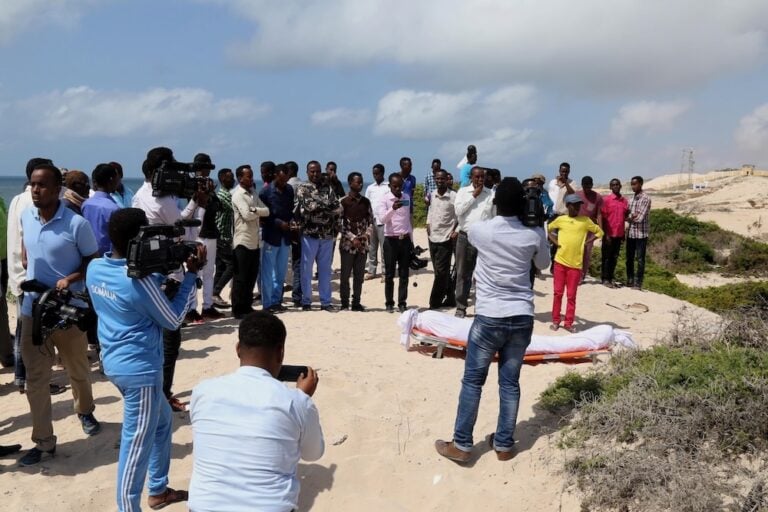(RSF/IFEX) – Reporters Without Borders is appalled by the attempted murder on 24 September 2007 of privately-owned Radio Shabelle’s acting manager, Jafar Mohammed “Kukay”, the latest target of a wave of political killings that seems to be aimed at demonstrating that the transitional federal government is unable to guarantee security in the Somali capital. The […]
(RSF/IFEX) – Reporters Without Borders is appalled by the attempted murder on 24 September 2007 of privately-owned Radio Shabelle’s acting manager, Jafar Mohammed “Kukay”, the latest target of a wave of political killings that seems to be aimed at demonstrating that the transitional federal government is unable to guarantee security in the Somali capital.
The press freedom organisation protests against the failure of federal and local authorities to protect independent journalists and leading civil society members who are the potential targets of this wave of killings, and against the fact that journalists continue to be arrested arbitrarily. Three were arrested in the past few days in the provinces of Puntland and Hiran.
“Caught in the crossfire of targeted killings and arbitrary arrests, Somali journalists have reached a critical threshold that is threatening the survival of an independent press in Somalia,” Reporters Without Borders said. “The transitional federal government’s failure to take action in these circumstances in incomprehensible.”
The attack on Mohammed was carried out by an unidentified man who pulled out a pistol from under his shirt and fired at him twice but failed to hit him. The assailant then fled. Radio Shabelle has not been broadcasting since a unit of police and intelligence officers opened fire 10 days ago on the central Mogadishu building that houses its studios because they suspected it had been used for a grenade attack on a patrol (see IFEX alerts of 19 and 18 September 2007). The government later said it was an “accident.” The station’s staff is either in hiding or trying to flee the country to get out of harm’s way.
The attempted shooting of Radio Shabelle’s manager brings the number of targeted attacks on journalists in the capital since January to four. Two of the journalists were killed in these attacks. Thirteen of Mogadishu’s 16 district commissioners or their deputies have been murdered in similar circumstances. The latest was shot by unidentified gunmen on the evening of 25 September.
This wave of killings is thought to be the work of Islamist insurgents fighting the transitional government that has controlled Mogadishu with support from Ethiopia and the international community since December 2006. The first journalist to fall victim to this kind of attack, one aimed at demonstrating the government’s inability to maintain security in the capital, was BBC producer Kate Peyton, killed on 9 February 2005 by gunmen loyal to a Mogadishu clan then controlling an Islamic court (see alerts of 8 February 2006 and 9 February 2005).
The government and the local authorities loyal to it meanwhile continue to arrest journalists who give them problems. Independent journalists Libaan Gahnug and Faysal Jama were arrested by the security forces of the semi-autonomous northeastern region of Puntland on 25 September after photographing fighting in the disputed town of Las Anod between Puntland troops and forces from the breakaway northern territory of Somaliland. Gahnug was released the same day but Jaama is still being held.
Hussein Hassan Dhaqane, a journalist with privately-owned Radio Darban, was arrested for still unknown reasons on the evening of 23 September in Beledweyne, in the southern Hiran region (100 km north of Baidoa). He is still being held by the regional police.


